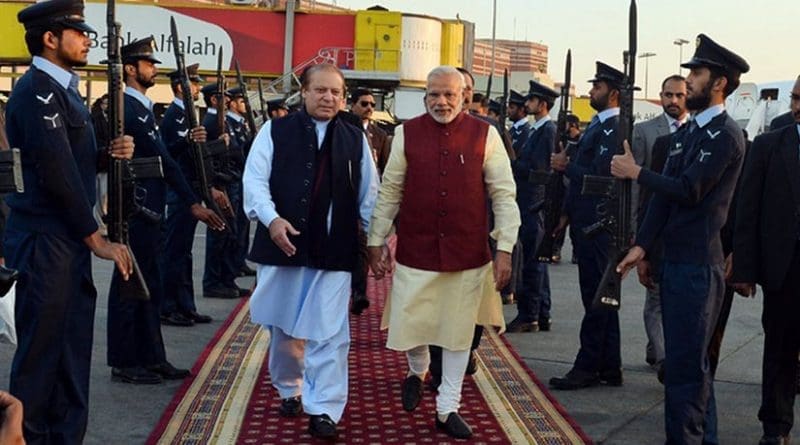India-Pakistan Talks: Negotiating Pitfalls – Analysis
By Amit Dasgupta*
The political decision to resume bilateral talks was a splendid, though surprising, initiative with which to end 2015 – a year that had seen considerable grief globally, especially through the massacre of innocents. Both the Indian and Pakistani Prime Ministers are politically savvy and, thus, acutely conscious that attempts would be made, from both sides of the border, to disrupt and derail the peace initiative.
The extraordinary challenge Prime Minister Modi faces is how he would continue to publicly advocate endorsement of the dialogue process when confronted by grieving families of dead soldiers and innocent civilians who had fallen victim to state-sponsored terrorism from across the border. For a politically shaky Nawaz Sharif, shaking hands with a state that saw the dismemberment of Pakistan has attracted the opprobrium of the powerful military establishment that de facto controls Islamabad.
How both leaders negotiate the multiple pitfalls the path is strewn with would not only demonstrate their leadership skills but also establish the negotiating template but, more importantly, it would demonstrate the joint integrity of intent and purpose. This is not easy assignment. Mercifully, expectations are tempered because failure is seen by most political, security and foreign policy analysts as a foregone conclusion. It is also how many in both countries would wish to ensure the talks would end.
The Pathankot attacks and the national alert that terrorists are planning a big ticket event on January 26, for instance, are a clear indication of vested interests that benefit from sustaining the India-Pakistan conflict and for whom, consequently, peace is anathema. Proof that the Pathankot operation had a clear Pakistan connection demonstrates the animosity with which any peace initiative would be perceived from across the border by those who see sponsoring terrorism as strategy. More importantly, the timing, most certainly, deferred the scheduled Foreign Secretary-level talks. More violent incidents cannot be ruled out. Getting New Delhi to retaliate ‘to get even’ and thereby, suspend talks yet again or better, escalate tensions would be the clear end objective of such players.
Apart from terrorists and their military handlers, there are many others who would also like to see the dialogue disrupted. I refer to political opponents. Instead of welcoming the initiative and extending it full support, the Congress Party opted for a petulant outburst through its spokesperson, Anand Sharma. He complained of not being kept in the loop! This was political immaturity at its best because strategic initiatives are never carried out in the public domain. Quiet diplomacy continues to be the most effective and persuasive strategy. The US breakthrough with Cuba or with Iran was a result of a series of secret parleys and negotiations that created history.
Then there are the hawks. They oppose talks till such time as conditions are conducive for talks. Forceful and eminent strategists occupy this space. They have made this India’s long stated position. Unfortunately, it has been a failed strategy. Indeed, if anything, it has only heightened belligerence on both sides of the border and played into the hands of those in Islamabad who have been long-term advocates of India-Pakistan animosity. Without a shift in vocabulary, the next seven decades are doomed to repeat the failed 70 years. How the political leadership in both countries handles the spoilers would demonstrate seriousness of commitment and purpose.
At the same time, there is political awareness that another 26/11 would have devastating consequences. This not only requires accurate and continuous intelligence to thwart an attack before it takes place but the ability to effectively respond when it occurs. Jammu and Kashmir Governor N N Vohra’s statement that the Pathankot attack could have been prevented is a sobering reminder that entering into talks does not mean that terrorist attacks would be suspended. Successful negotiators are constantly mindful of the need to be alert, vigilant and prepared. They know that while you might shake hands above the table, you are open to being kicked from underneath.
Simultaneously, PM Modi needs to recognize that the current perception is that while he is excellent in raising expectations, he is a dismal failure when it comes to delivery. This is because he lacks clarity on next steps and thus, a strategy for implementation. This can seriously erode credibility. In the case of PM Sharif, the problems are even more acute. The dialogue initiative does not enjoy the support of the military establishment. Given Pakistan’s history, he knows he is on slippery ground and if his overtures with New Delhi alienate the generals and the fundamentalists, he could easily invite assassination. The outlier in Pakistan is dispensable.
Negotiating pitfalls is the biggest test that the India-Pakistan talks face. These are talks not between friends but neighbours, who harbour deep mistrust about each other and not without reason. Yet the driving rationale is the transformational impact peace would have on the economic and social wellbeing of both countries and hence, of the impoverished region. To realize this aspiration, both governments need to recognize that they are walking a tight rope. Only strong and unwavering political will based on realism would enable them to negotiate the pitfalls.
*Amit Dasgupta, a former diplomat, currently heads the Mumbai campus of the SP Jain School of Global Management. He may be reached at [email protected]

